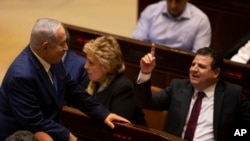Israel's four Arab political parties formalized a merger on Monday ahead of September elections, hoping to boost turnout among the minority that comprises a fifth of the country's population.
The Palestinian nationalist Balad party announced late Sunday night that it would join a reunited Joint List of Arab parties, months after infighting fragmented the political alliance.
Ayman Odeh, head of the Hadash party, said Monday that now that the parties have reunited, they can address the ``great challenge'' facing the country's Arab minority.
Israel's Arab population mainly consists of Palestinians who remained in Israel after its creation in 1948 and their descendants. They largely identify with the Palestinians, and have long complained of discrimination.
Israeli electoral polls published last week projected that the Joint List could become the third largest party in the Knesset, Israel's parliament, after the September 17 elections.
The four factions first united in 2015, earning 13 seats in the 120-seat Knesset. But infighting later split the Joint List into two parties, which only won a combined 10 seats amid low Arab turnout in April's election. Around 49% of Arabs cast ballots, down from 64% in the 2015 election.
Israel faces an unprecedented repeat election in September after Prime Minister Benjamin Netanyahu failed to form a majority coalition government. Instead, his ruling Likud party advanced a bill to dissolve parliament, sending Israelis to the polls for a second time in 2019.
The Joint List merger came days before this week's deadline for Israeli political parties to finalize their lineups before the elections.
Last week, former prime minister Ehud Barak and the left-wing Meretz party announced the formation of a merger to form the Democratic Union, whose stated aim is to oust Netanyahu, who became Israel's longest-serving prime minister earlier this month.
Former Justice Minister Ayelet Shaked, who assumed the leadership of her New Right party last week, is negotiating a union with a constellation of religious nationalist parties headed by Education Minister Rafi Peretz. The New Right party failed to win enough votes in April's election to enter the Knesset.




